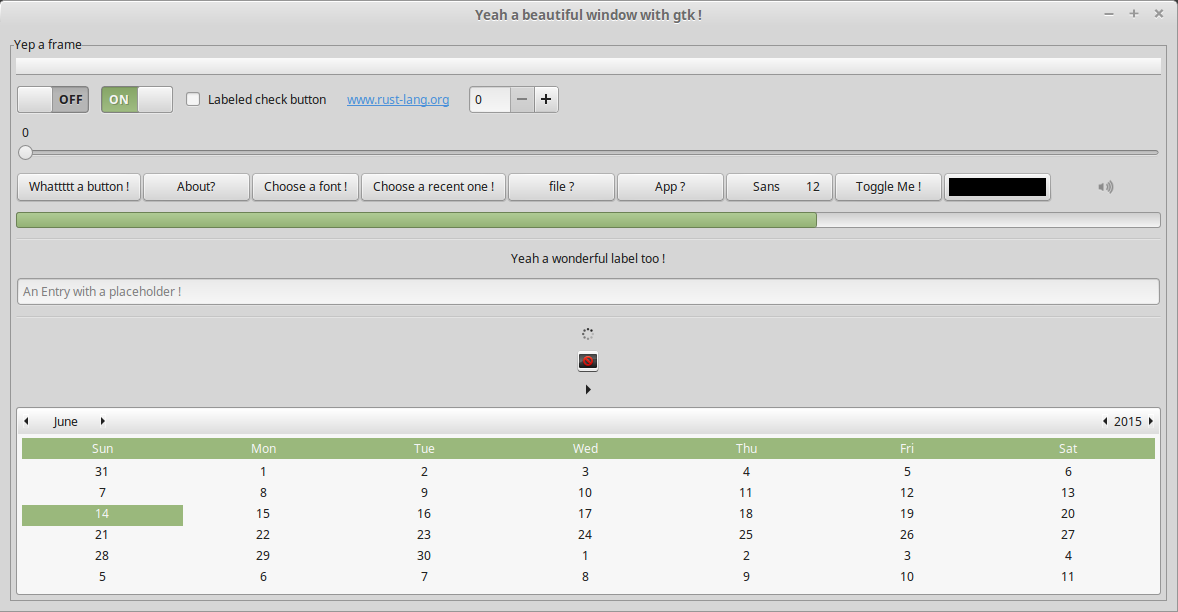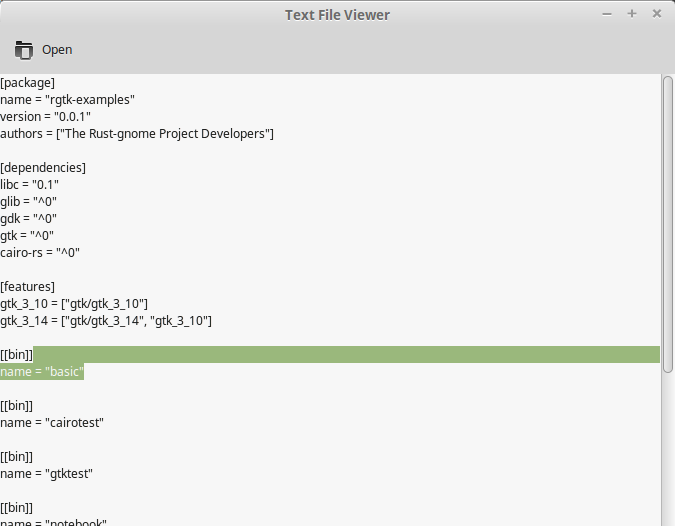Please check the build logs for more information.
See Builds for ideas on how to fix a failed build, or Metadata for how to configure docs.rs builds.
If you believe this is docs.rs' fault, open an issue.
gtk 
 

Rust bindings and wrappers for GLib, GDK 3, GTK+ 3 and Cairo. Online documentation.
Building
gtk expects GTK+, GLib and Cairo development files to be installed on your system. Optionally, it is recommended to install the debug packages containing helpful debug symbols.
Debian and Ubuntu
> sudo apt-get install libgtk-3-dev
> sudo apt-get install libgtk-3-0-dbg libglib2.0-0-dbg libcairo2-dbg
Fedora
> sudo dnf install gtk3-devel glib2-devel
# Fedora 21 and earlier
> sudo yum install gtk3-devel glib2-devel
OS X
> brew install gtk+3
Windows
Install mingw-w64 (select the win32 threading model) and download a GTK+ SDK:
- The GNOME project has an official distribution of GTK+ 3.6: x86, x64.
- GTK+ for Windows Runtime Environment Installer: 64-bit supports GTK+ 3.14, its SDK downloads can currently be found here.
Make sure both mingw's and the sdk's bin directories are in your PATH e.g. (assuming mingw is installed in C:\mingw-w64 and the SDK unpacked into C:\gtk)
C:\> set PATH="C:\mingw-w64\bin;C:\gtk\bin;%PATH%"
If your Rust installation has gcc.exe and ld.exe in its bin directory, you may
get a linking error ld: cannot find -limm32. In that case remove those executables,
they will be provided by mingw instead.
Versions
The build script will query the installed library versions from pkg-config
and instruct rustc via cfg arguments to compile the appropriate set of APIs.
All the APIs available in the installed library will just work but if you attempt to use newer ones, the build will fail. Presently, Rust doesn't allow to generate custom error messages so there doesn't appear to be a way to make such errors more friendly.
Examples are providing in the gtk-rs/examples repository, you can find some tests showing off the functionality, these can be built and run as follows:
> cargo build --release
> ./target/release/gtktest
> ./target/release/cairotest
Documentation
Browse the documentation at our website.
Including gtk as a cargo dependency
To include gtk as a cargo dependency you have to add it to your Cargo.toml:
[]
= "0.0.4"
Use gtk
To implement GTK+ inheritance in rust, we implemented gtk superclasses as traits located in gtk::gtk::traits::*. The various widgets implement these traits and live in gtk::gtk::*.
For your convenience the various traits are reexported in the gtk::* namespace as Gtk{trait_name}Trait so you can just use...
extern crate gtk;
use *;
...to easily access all the gtk widgets and all traits methods:
let button = Button:new; // You have access to the struct methods of gtk::Button aswell
// as the trait methods from gtk::traits::Button as GtkButtonTrait.
Projects using gtk
If you want yours to be added to this list, please create a Pull Request for it!
##Screenshots


Contribute
Contributor you're welcome!
You probably know but Gtk+ uses its own GObject system: inherited class and interface.
To respect this design, I follow a special design on gtk:
- Interface -> Implement them on a trait with only default methods.
- Class -> Implement the construct on the class impl and other methods on a traits.
- Sub-class -> Implement all the methods on the class.
Example for GtkOrientable, GtkBox, GtkButtonBox:
GtkOrientable is an interface with all methods implemented as default method of the trait gtk::traits::Orientable.
GtkBox is a class with constructors implemented on the struct gtk::Box, and the other method as default methods of the trait gtk::traits::Box. So gtk::Box implements gtk::traits::Orientable and gtk::traits::Box.
GtkButtonBox is a sub-class of GtkBox, the struct gtk::ButtonBox implements all the methods of GtkButtonBox and the traits gtk::traits::Orientable and gtk::traits::Box.
Finally, all the gtk widgets implement the trait gtk::traits::Widget.
License
gtk is available under the MIT License, please refer to it.